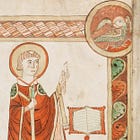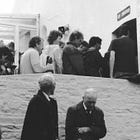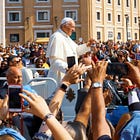
Is there a schism between traditionalists?
What is schism? Who is actually submissive to legitimate authority? Are disagreements over “The Pope Question” the grounds and manifestation of schism?

Who is actually submissive to legitimate authority? And are disagreements over “The Pope Question” the grounds and manifestation of schism?
In this discussion, it is customary to use the terms “sedeplenists” and “sedevacantists”, which respectively refer to those who think that the See of St Peter is or is not occupied. These terms, particularly the former, are unfortunate due to the amount of historical and intellectual baggage accompanying them. For the purposes of this discussion, these terms refer solely to the Pope Question, and not to the other issues which often accompany it.
Being in the Church
In order to be in the Church, a member of the Church, one must be baptised, profess the faith, and not be separated from the body either by oneself or by authority. The last two points are sometimes summarised as being “submissive to legitimate authority.”
What does this mean for us today? What does it mean for the relationship between those traditionalists who claim to recognise Francis as pope, and those who don’t?
Contingent matter or dogmatic fact?
When sedevacantists conclude that Francis’s claim is doubtful or invalid, this conclusion does not necessarily separate them from the body of men who think otherwise – the sedeplenists. Disagreement over a contingent matter such as the identity of the Roman Pontiff is not, in itself, sufficient evidence of a rupture of unity – neither of faith, nor even of government.
Let’s start by considering the status of the proposition, “This man is the pope.” This is a “contingent matter,” until such point as it becomes a “dogmatic fact.”
It is well known that the peaceful and universal adherence of the Church to a man as pope is a “dogmatic fact,” and constitutes a conclusive proof that he is what he appears to be. This adherence is not a requirement of being a true pope – and its absence does not necessarily prove that a man is illegitimate or doubtful.
However, if we look at the explanation for the proof in Cardinal Billot’s work, we find the following:
“[F]or the Church to adhere to a false pontiff would be the same thing as if she were to adhere to a false rule of faith, since the Pope is the living rule which the Church must follow in belief and always follows in fact […] By all means God can permit that at some time or other the vacancy of the see be extended for a considerable time. He can also allow a doubt to arise about the legitimacy of one or another man elected.
“But He cannot permit the entire Church to receive someone as pontiff who is not a true and legitimate [pope].
“Therefore, from the time he has been accepted and joined to the Church as the head to the body, we cannot further consider the question of a possible mistake in the election or of a [possible] deficiency of any condition whatsoever necessary for legitimacy, because the aforementioned adherence of the Church radically heals the mistake in the election and infallibly indicates the existence of all requisite conditions.”[1]
Once the universal church adheres to a man as the proximate rule of faith, there can be no doubt that he is the legitimate pontiff, however it is that he got there. But we deny that Francis and several of his recent predecessors ever were “accepted and joined to the Church” in the way that Billot describes.
It is not credible to claim that Francis et al. have been received in this way, as the proximate rule of faith, by the entire Church. Traditionalists have followed, cited and applauded these claimants when they agree with traditional doctrine – but these claimants have by no means been their proximate rule of faith. This applies also to conservatives, particularly those who almost insert themselves into the equation, by mediating and interpreting Francis’ words.
In simplistic terms, the traditionalist has been compelled by circumstances to adopt, as his proximate rule, what Nicolau calls the “quasi-contemporary magisterium”, and to some extent what is called the “remote” rule of faith, namely Holy Scripture and Tradition. This is because it is impossible to adhere to Francis et al. as our proximate rule without either losing the faith, or contradicting things which we have a prior obligation to profess.
Similarly, liberals have followed, cited and applauded Francis et al. when these men have done liberal things, but otherwise disregarded them.
Aside from being obviously true, this situation – and its implications for the idea of peaceful and universal adherence – was also observed by the respected author Arnaldo Vidigal Xavier da Silveira, who posed these questions and left them unanswered:
“[W]ould a certain very generalized though not always well defined distrust be sufficient to destroy the apparently pacific and universal character of the acceptance of the Pope? And if this distrust became a suspicion in numerous spirits, a positive doubt in many, a certainty in some, would the aforementioned pacific and universal acceptance subsist?
“And if such distrusts, suspicions, doubts and certainties cropped out with some frequency in conversations or private papers, or now and again in published writings, could one still classify as pacific and universal the acceptance of a Pope who was already a heretic on the occasion of his election by the Sacred College?”[2]
In light of these questions, we can see that it is quite doubtful whether there has been a peaceful or universal adherence to these men in the relevant sense. If there had been, we would have assurance of their legitimacy.
This absence of clear, peaceful and universal adherence in our time does not prove that these men are illegitimate. But it does nullify this particular argument for the legitimacy of the recent claimants – and thus cannot provide grounds for raising their claims above the status of contingent matters.
This has been discussed at considerable length by my colleague
below:What about schism?
The 1917 Code of Canon Law defines schism in this way:
Can. 1325 §2: […] if finally he refuses to be under the Supreme Pontiff or refuses communion with the members of the Church subject to him, he is a schismatic.[3]
First, submission to the Supreme Pontiff. Regarding sedeplenists: it should be obvious that submission to the wrong man as pope, by those who are mistaken in good faith, is not the same as refusing submission to the true pope. So if sedevacantists are right, they have no need to accuse sedeplenists of being in schism by that fact alone.
In fact, there are no grounds for either side to be accusing each other of even “material schism” based on their attitude towards Francis’ claim. As with material heresy, such a term does not apply to this situation at all.
It should also be clear that a sedeplenist who is mistaken about the identity of the pope is not a heretic by that fact alone – although some, through “rethinking the papacy,” may come to profess heresy or other doctrinal errors in their attempts to “square the circle” when it comes to Francis. But each case needs to be considered individually, and the point is that we have no principle requiring us to accuse sedeplenists of schism or heresy.
But what if sedeplenists are right, and Francis is the pope – where would that put sedevacantists?
First, they do not refuse to be under the Supreme Pontiff; they deny that Francis is the Supreme Pontiff. If it could be established that he was, they would submit to him.
This certainly does not constitute schism. Consider this text from Wernz-Vidal:
“They cannot be numbered among the schismatics, who refuse to obey the Roman Pontiff because they consider his person to be suspect or doubtfully elected on account of rumors in circulation.”[4]
Szal writes:
“Nor is there any schism if one merely transgress a Papal law for the reason that one considers it too difficult, or if one refuses obedience inasmuch as one suspects the person of the Pope or the validity of his election, or if one resists him as the civil head of a state.”[5] (Emphasis added)
And de Lugo cites two other authors supporting his view:
“Third, he will not be a schismatic who denies submission to the Pope because he doubts probably about his legitimate election or his authority: see Sanchez, who discusses others in Book I of the Decalogue, Chapter 35, in the third and fourth numbers, in the fourth disputation, in the fifth point.”[6] (Emphasis added)
Let’s note that doubts about elections are not limited to rumours of skullduggery and so on, but include the ineligibility of a non-Catholic for the papacy. Finally, from Cajetan:
“If someone, for reasonable motive, holds the person of the pope in suspicion and refuses his presence and even his jurisdiction, he does not commit the delict of schism, nor any other whatsoever, provided that he be ready to accept the pope were he not held in suspicion.”[7]
This latter clause – mentioning readiness to submit to an undoubted Roman Pontiff – certainly applies to us.
We could provide other such texts. Many today acknowledge that sedevacantists present some strong arguments, even if they think they are missing something – and strong arguments are the very essence of a “reasonable motive.”
I argued above, too, that the sedeplenist “submission” to Francis et al. is merely verbal, and that there is less daylight between traditional Catholics than some anti-sedevacantists want to suggest.
So much for schism between us there.
However, as Canon 1325 says, one can also enter into schism when one “refuses communion with the members of the Church subject to [the Roman Pontiff].”
This might happen by forming a sect and refusing communion with other Catholics. The German canonist Heribert Schauf writes as follows, with the most relevant part at the end of the extract:
“Schism arises in two ways:
By someone refusing to be subject to the Pope, or
By someone refusing to maintain communion with members of the Church who live in communion with the Holy See.
“Schism consists of the deliberate and willful separation of the baptized from the unity of the Catholic Church.
“The unity of the Church consists in the unity of its members with the visible head, the Pope, and in the unity of its members with each other. Schism requires more than opposition to an individual ruling bishop. It suffices if there is opposition to the Pope, provided that this opposition is not simple disobedience, but a fundamental refusal to submit to the Pope as the head of the universal Church.
“A pure schism is not easily possible. It is often associated with heresy, the rejection of the primacy of jurisdiction and infallibility of the Pope. The establishment of an independent community is not necessary for the concept of schism. It is also not required for a schismatic to refuse submission to the Holy See. It suffices if the schismatic breaks communion with the reigning Pope as such. One can be a total or partial schismatic, depending on whether they refuse to submit to the Pope in all matters or only in some. The crime of schism is present in both cases.
“A schismatic is also someone who appeals to a General Council against decisions of the Pope without theoretically doubting the jurisdictional authority of the Pope. Schism can occur through the establishment of antipopes. National churches can deviate into schism.
“During a vacancy of the Papal See, schism in its second form, the separation from the members of the Church, is possible without denying the bond of communion and the authority of the Pope. If heresy is directed against the unity of faith and against this unity, then schism is directed against the bond and unity, against the divinely ordained order of the Body of Christ.”[8] (Emphasis added)
There may be sedevacantist sects or sectarians, but the conclusion is just that – a conclusion. One does not pass from one club to another by forming this conclusion – even if one changes where one goes to Mass, or those with whom one associates, or simply corrects previously held ideas.
But membership of the Church is determined by the criteria already explained, and not by adherence to or mistakes about contingent matters alone, nor by merely verbal claims on one side or another.
Conclusion
As mentioned, it is possible for verbal claims to harden into descriptions of reality. Some come to treat their chapel, or order of priests, as if it really were the Church. This sectarian mentality is a danger for many groups today, on all sides of this question – but it is not necessitated by one conclusion, or the contrary.
But everyone who is a Catholic is in the Church, and even if Francis is the pope, a mistake about a confusing contingent matter would not, in itself, cause someone to stop being a Catholic. Unless someone posits some other act which separates him from the Church (viz. heresy, schism or apostasy), Catholics who remain sedeplenists are united and in communion with Catholics who are sedevacantists – whether they like it or not, and even if they don’t realise it, or verbally deny it.
Let’s end with St Augustine’s words about St Cyprian – another of the Fathers, who happened to hold a false opinion on a doctrinal matter. In our dealings with fellow Catholics, would it not be good for us to imitate these two saints, whose characters both appear clearly in St Augustine’s words?
“[I]f, in common with the Church at large, I entertain any doctrine more true than his, I will not prefer my heart to his, even in the point in which he, though holding different views, was yet not severed from the Church throughout the world. […]
“[W]hen that question was yet undecided for want of full discussion, though his sentiments differed from those of many of his colleagues, yet he observed so great moderation, that he would not mutilate the sacred fellowship of the Church of God by any stain of schism, [and in this] a greater strength of excellence appeared in him than would have been shown if, without that virtue, he had held views on every point not only true, but coinciding with their own.”[9]
Further Reading
HELP KEEP THE WM REVIEW ONLINE!
As we expand The WM Review we would like to keep providing free articles for everyone.
Our work takes a lot of time and effort to produce. If you have benefitted from it please do consider supporting us financially.
A subscription from you helps ensure that we can keep writing and sharing free material for all. Plus, you will get access to our exclusive members-only material.
(We make our members-only material freely available to clergy, priests and seminarians upon request. Please subscribe and reply to the email if this applies to you.)
Subscribe now to make sure you always receive our material. Thank you!
[1] Louis Cardinal Billot, Tractatus De Ecclesia Christi 5th Edition, Rome: Gregorian Pontifical University, 1927. Excerpt: Thesis XXIX, translated by Novus Ordo Watch, available at https://novusordowatch.org/billot-de-ecclesia-thesis29/. Cited text from §3.
[2] Arnaldo Vidigal Xavier da Silveira, Two Timely Issues: The New Mass and the Possibility of a Heretical Pope, The Foundation for a Christian Civilization, trans Spann and Schelini, Penn, 2022, p 247.
[3] The 1917 or Pio-Benedictine Code of Canon Law, in English Translation with Extensive Scholarly Apparatus, trans. Dr Edward Peters, Ignatius Press, San Francisco, 2001
[4] Francisco X. Wernz, Petri vidal, Ius Canonicum, Vol vii, 1937, n. 398.
[5] Rev. Ignatius J. Szal, The Communication of Catholics with Schismatics, p 2. The Catholic University of America Press, Washington DC, 1948. Available at: https://archive.org/details/communicationofcatholicswithschismaticsrev.szal/page/n11/mode/2up
[6] Juan de Lugo: Disp., De Virtute Fidei Divinae, pp 646-7, Disp xxv, sect iii, nn. 35-8, in Disputationes scholasticae et morales de virtute fidei diuinae, 1696. Translation by ChatGPT. Available at: https://archive.org/details/bub_gb_0SMTVLujVlUC/page/645/mode/2up
[7] Cajetan, Commentarium, 1540, II-II, 39, 1.
[8] Heribert Schauf, Einführung in das kirchliche Strafrecht (Introduction to the Ecclesiastical Penal Law), 1952. Published by Diocesan seminary of Aachen, p. 123. Written in German, translated by a friend of The WM Review.
[9] St. Augustine, On Baptism, Against the Donatists, Book V. Translated by J.R. King and revised by Chester D. Hartranft. From Nicene and Post-Nicene Fathers, First Series, Vol. 4. Edited by Philip Schaff. (Buffalo, NY: Christian Literature Publishing Co., 1887.) Revised and edited for New Advent by Kevin Knight. <http://www.newadvent.org/fathers/14085.htm>






